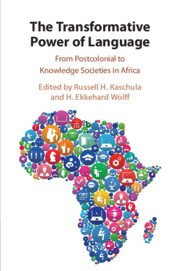Book contents
- The Transformative Power of Language
- The Transformative Power of Language
- Copyright page
- Contents
- Figures
- Tables
- Contributors
- Preface
- Abbreviations and Acronyms
- Introduction
- Part I Mental Decolonisation and Cultural Diversity
- Part II Multilingualism and Intellectualisation of African Languages
- Part III Digitalisation and Democratisation of Knowledge
- Part IV Interlingual and Intercultural Cross-Fertilisation
- 14 Orality in the Digital Age
- 15 Interpreting Research in South Africa
- 16 Exploring the Potential of Increasing Epistemological Access for University Students of African Languages through the Translation of English Academic Texts
- 17 Translation in Foreign Language Teaching
- Index
- References
16 - Exploring the Potential of Increasing Epistemological Access for University Students of African Languages through the Translation of English Academic Texts
from Part IV - Interlingual and Intercultural Cross-Fertilisation
Published online by Cambridge University Press: 18 September 2020
- The Transformative Power of Language
- The Transformative Power of Language
- Copyright page
- Contents
- Figures
- Tables
- Contributors
- Preface
- Abbreviations and Acronyms
- Introduction
- Part I Mental Decolonisation and Cultural Diversity
- Part II Multilingualism and Intellectualisation of African Languages
- Part III Digitalisation and Democratisation of Knowledge
- Part IV Interlingual and Intercultural Cross-Fertilisation
- 14 Orality in the Digital Age
- 15 Interpreting Research in South Africa
- 16 Exploring the Potential of Increasing Epistemological Access for University Students of African Languages through the Translation of English Academic Texts
- 17 Translation in Foreign Language Teaching
- Index
- References
Summary
This chapter seeks to explore the potential of increasing epistemological access for university students of African languages through the translation of English academic texts. It uses charts and tables to illustrate the negative effects that the scarcity of academic texts written in African languages has on students’ academic performance. A scientific text based on periodontal examination was translated from English to isiXhosa. Thereafter, ten test questions based on this text were drawn up using Bloom’s Taxonomy model. These questions were made available in both English and isiXhosa and were distributed among twenty-five first-year students of an isiXhosa mother tongue course. In this group, thirteen students wrote the test in isiXhosa, while twelve of them wrote it in English. The test results were compared to investigate whether students obtain higher marks when taught and examined in their first language or in their additional language. Ultimately, the researcher tried to investigate whether or not there is a relationship between students’ academic performance and their language of teaching and learning (LoTL). Furthermore, the study investigated the significance of mother-tongue-based education for curriculum access.
Keywords
- Type
- Chapter
- Information
- The Transformative Power of LanguageFrom Postcolonial to Knowledge Societies in Africa, pp. 326 - 350Publisher: Cambridge University PressPrint publication year: 2020

